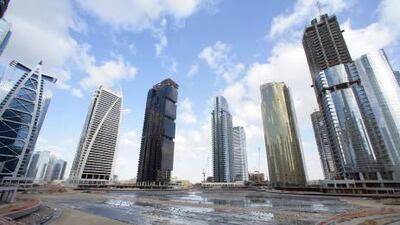As hundreds of investors receive cancellation notices on defaulted properties across Dubai, the consolidation of the sector is approaching its endgame. The move to cancel contracts and repossess properties is a last resort for developers whose profits have dwindled since the financial crisis took hold, experts say.
Property developers have come under increasing pressure to know what future income they can expect to generate from units that were sold at the peak of the market, many of which are now in default. The final notices that are now being sent to investors who have missed payments in projects that are 80 per cent or more complete marks the end of a consolidation process which, for most developers, began about 18 months ago.
"I think the auditors have come in and started to put pressure on where the receivables are coming from," said Ian Albert, the regional director of Colliers International. "At the end of the day, a developer wants to sell. It really is a last resort to go down this route." Nabil Ahmed, the regional head of research at Deutsche Bank, said that after more than a year of trying to limit defaults through consolidation, some developers are now clamping down on the "20 or 30 per cent of those they couldn't help and who are defaulting simply because they don't have the means to pay the remaining amount".
Still, investors who have missed payments are standing their ground because they could lose the down payments they made on investments they hoped would generate lucrative returns. Some have formed groups to take class actions against developers trying to repossess properties. The stalemate is a result of the huge speculation that took place in Dubai's property sector in 2007 and 2008, when prices surged 78 per cent.
"It's basically people who were caught when the market was effectively a trade market rather than an occupier's one," Mr Albert said. It was also a time when banks were happy to pair up with developers to offer attractive home finance deals. Abu Dhabi Commercial Bank (ADCB), for example, agreed with Al Fajer Properties in 2005 to offer 60 per cent financing to customers in Jumeirah Business Centre 5.
The deal involved buyers making payments over 10 years from the project's completion, making it appealing to those who were unseasoned investors. Both Al Fajer and ADCB recently confirmed that the credit line, which was worth about Dh500 million (US$136.1m), was cut towards the end of 2008 as the financial crisis took hold in the emirate's property sector. One British investor, who asked not to be named, bought two floors of office units in Jumeirah Business Centre 5 on the understanding that she would get a mortgage.
At the height of the boom in 2008, she paid 40 per cent for one floor of office space and 50 per cent on the other at Dh1,100 a square foot. She is also among the dozens of investors in the project who recently received termination notices. "I actually have a brochure that states we'd get preapproved finance," she said. "We paid a big premium to get the comfort of having pre-approved finance ? We weren't told until recently that we wouldn't get it. When the market and the world economy changed, we raised this issue and were told, 'don't worry about it, we'll work something out' ? We proposed to do a merger of the two floors and pay additional funds but were told 'no'."
Meanwhile, Jumeirah Business Centre 5, which is almost ready for handover, has a default rate of about 85 per cent. A senior source within Al Fajer, who asked not to be named, said: "We have customers who did get financing; the developers also thought they were going to get financing for their projects and didn't. We barely got any financing - 80 per cent was done with cash." Other property developers have also started to send cancellation notices to investors including Al Mazaya and Omniyat Properties.
Mohammed Sultan Thani, the assistant director general of the Dubai Land Department, concedes there is no clear-cut solution to the deadlock. Hundreds of termination letters have been sent out by the department in recent months, he said, and an investor who wishes to dispute a termination notice needs to go to court. Successful sales in the auction process will also put more pressure on Dubai's already oversupplied property market, Mr Albert added. But the process may not be entirely smooth.
"What finance will be available for people to buy at auction? You'd be looking at a very small pool of cash buyers, and they will seek very attractive prices in order to put cash into non-completed properties." agiuffrida@thenational.ae

